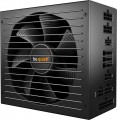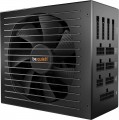Efficiency
Efficiency, in this case — the ratio of the power of the power supply (see "Power") to its power consumption. The higher the efficiency, the more efficient the power supply, the less energy it consumes from the network at the same output power, and the cheaper it is to operate. Efficiency may differ depending on the load; the characteristics can indicate both the minimum efficiency and its value at an average load (50%).
It should be noted that compliance with one or another level of 80PLUS efficiency directly depends on this indicator (for more details, see "Certificate").
ATX12V version
A standard for power supplies that supplements the ATX specifications regarding power supply along the 12 V line. Introduced into use since the time of the Intel Pentium 4 processor. In the first series of the standard, the +5 V line was mainly used; from version 2.0, the +12 V line was introduced to fully power the components computer. Also in the second generation, a 24-pin power connector appeared, used in most modern motherboards.
SATA
The number of SATA power connectors provided in the PSU.
Nowadays, SATA is the standard interface for connecting internal hard drives, and it is also found in other types of drives (SSD, SSHD, etc.). Such an interface consists of a data connector connected to the motherboard, and a power connector connected to the PSU. Accordingly, in this paragraph we are talking about the number of SATA power plugs provided in the PSU. This number corresponds to the number of SATA drives that can be simultaneously powered from this model.
MOLEX
The number of Molex (IDE) connectors provided in the design of the power supply.
Initially, such a connector was intended to power peripherals for the IDE interface, primarily hard drives. And although the IDE itself is completely obsolete today and is not used in new components, however, the Molex power connector continues to be installed in power supplies, and almost without fail. Almost any modern PSU has at least
1 – 2 of these connectors, and in high-end models this number can be
7 or more. This situation is due to the fact that Molex IDE is a fairly universal standard, and with the help of the simplest adapters, components with a different power interface can be powered from it. For example, there are Molex - SATA adapters for drives, Molex - 6 pin for video cards, etc.
PCI-E 8pin (6+2)
The number of PCI-E 8pin (6+2) power connectors provided in the PSU design.
Additional PCI-E power connectors (all formats) are used to additionally power those types of internal peripherals for which 75 W is no longer enough, supplied directly through the PCI-E socket on the motherboard (video cards are a typical example). In PC components, there are two types of such connectors — 6pin, providing up to 75 W of additional power, and 8pin, giving up to 150 W. And the 8pin (6 + 2) plugs used in power supplies are universal: they can work with both 6-pin and 8-pin connectors on the expansion board. Therefore, this type of plug is the most popular in modern PSUs.
As for the quantity, on the market you can find models
for 1 PCI-E 8pin (6 + 2) connector,
for 2 such connectors,
for 4 connectors, and in some cases —
for 6 or more. Several of these plugs can be useful, for example, when connecting several video cards — or for a powerful high-performance video adapter equipped with several PCI-E additional power connectors.
PCI-E 16pin
the 16-pin PCI-E power connector is designed to replace the existing 8-pin counterparts. It consists of twelve lines for current supply and four more for data transmission. The connector provides up to 600 W of additional power, which is a fourfold increase in power compared to 8-pin versions of the interface. Additional PCI-E connectors of all formats are used to power those types of internal peripherals that are no longer enough with 75 W supplied directly through the PCI-E socket on the motherboard.
Floppy
The presence of at least one Floppy power connector in the PSU.
Initially, this connector was intended to power floppy disk drives, hence the name. It is also known under the designation "mini-Molex". Anyway, this standard is generally considered obsolete, but it is still used by some specific types of components, and therefore continues to be used in power supplies.
Braided wires
The presence of a braid in the complete wires of the system unit — for all or at least for some.
This feature has a positive effect on reliability, making the wire as resistant as possible to bending, abrasion, strong pressure and other similar influences; it also provides additional protection against accidental contact with sharp objects (for example, when repairing a PC). The disadvantages of braided wires, in addition to increased cost, are also increased thickness and greater rigidity than similar cables in conventional insulation. This can create some difficulties in organizing space inside the system unit.
+12V1
The maximum current that the PSU is capable of delivering to the first power line is + 12V.
For more information about power lines in general, see "+3.3V". Here it is worth mentioning that 12 V is the most popular voltage among computer power connectors. It is used in almost all such connectors (with a few exceptions), and some plugs (for example, additional PCI-E power for 6 or 8 connectors) use only 12-volt lines — and in the + 12V format. And the division of + 12V power into several separate lines is used for safety purposes — in order to reduce the current flowing through each individual wire, and thus prevent excessive load and overheating of the wiring. However, some manufacturers do not specify the maximum current for individual + 12V lines and give only a general value in the characteristics; in such cases, this number is indicated in this paragraph.

